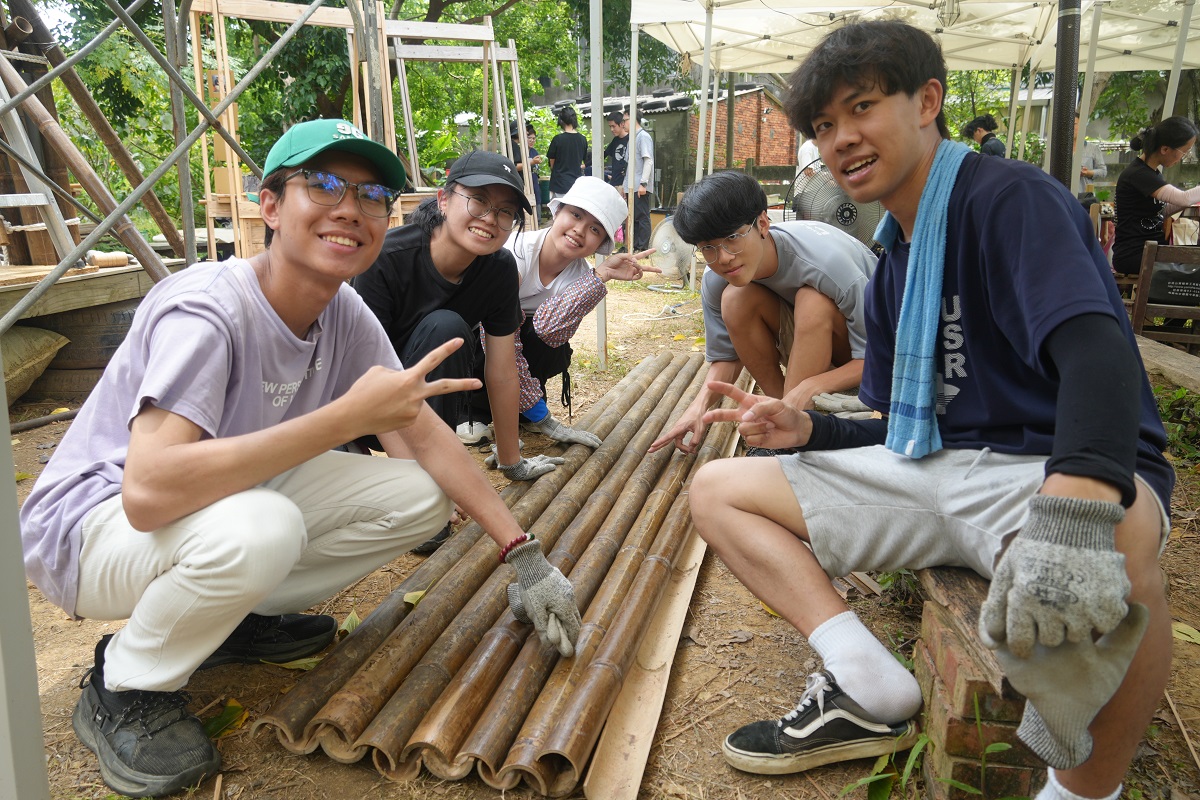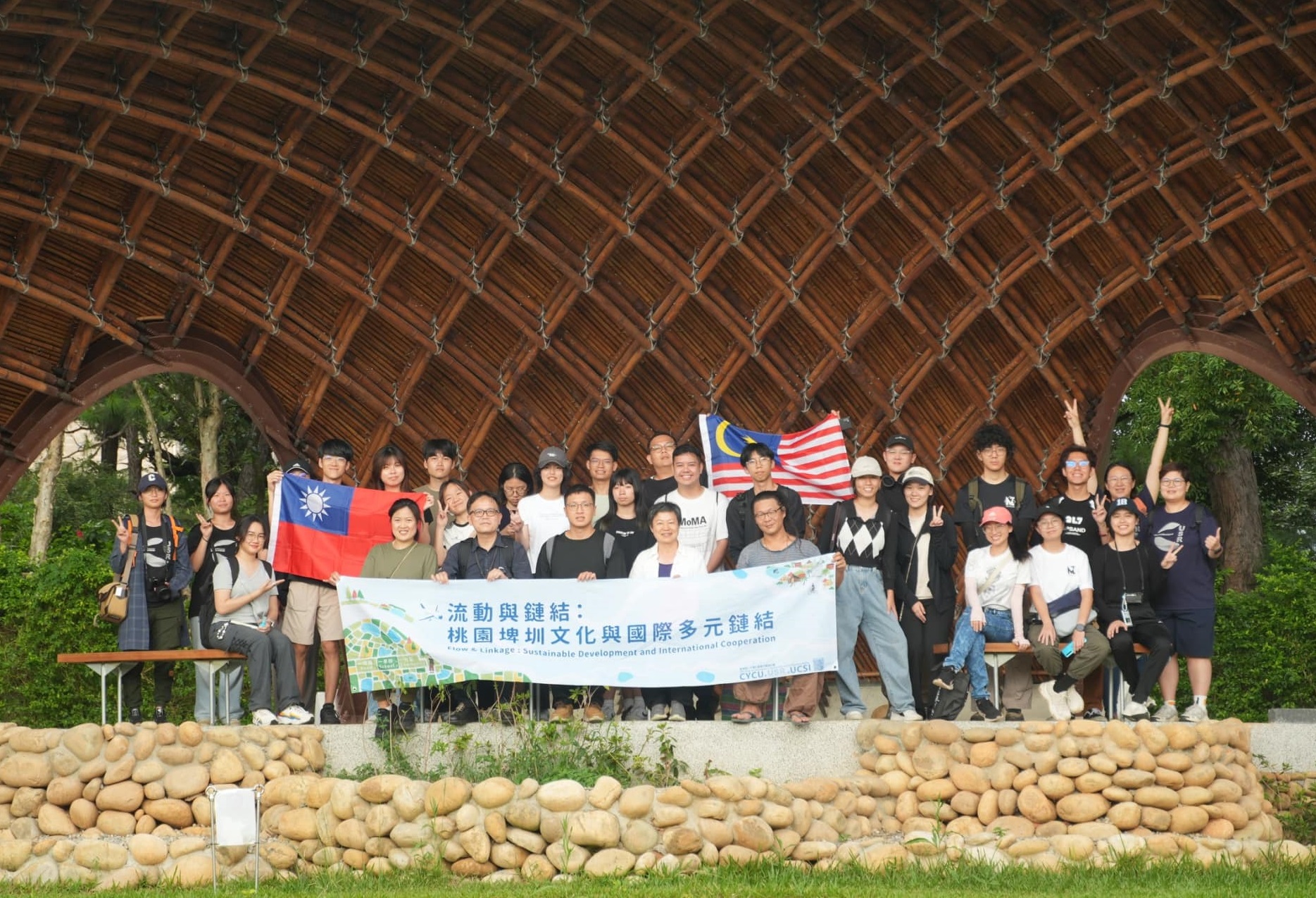This summer, the College of Design at Chung Yuan Christian University welcomed faculty and students from UCSI University in Malaysia as part of the “USR Pingtung Plan” to host the fourth “International Design Workshop.” Unlike previous design discussions, this workshop focused on hands-on activities, creating important spaces for local markets, training, and education. Through the practical work, participants not only learned about sustainable environmental coexistence and bamboo material structures but also established connections with the local community, collaboratively contributing to the development of Taoyuan.

Professor Peng Wenhui from Chung Yuan Christian University shared practical cases of a sustainable campus, from rain gardens to green buildings, highlighting the “Big Tree Classroom” experience by the Department of Landscape Architecture. Professor Li Yanyi introduced the topic of sustainable environments, delving into the core concepts and practical methods of sustainable development, emphasizing the balance between environmental protection and resource utilization. Lin Yarong, the chairman of the Taiwan Permaculture Design Association, discussed sustainable living practices, encouraging students to think about how to connect biological environments and consider space planning through the lens of ecological pathways, enhancing their understanding and learning of sustainability issues.

Additionally, through action-oriented explorations of ponds and settlements, students engaged in quick design thinking. They utilized drawings or models to consider local characteristics and needs, creating designs that meet these requirements while preserving local features and taking the environment into account. Addressing community issues such as ecological toilets, unmanned vegetable stalls, and happy chicken coops, students proposed creative solutions and moved into practical implementation. They used bamboo as a sustainable building material, collaborating with local residents to reconstruct important spaces for future markets, new agricultural talent training, and environmental education.

Chien Yun-Hsiang, a student from the Department of Landscape Architecture at Chung Yuan Christian University, believes that this USR activity not only provided him with valuable hands-on experience but also made him more familiar with bamboo as a natural building material. In terms of design, the exchange with Malaysian students exposed him to different design perspectives, allowing him to understand and learn from Malaysian design concepts, thus broadening his thinking and vision.

UCSI University’s Professor Huang Liang-Yi expressed that the workshop provided students with valuable experiences, from understanding the impact of local pond landscapes and the environment on residents to learning bamboo construction techniques using sustainable local materials. Through hands-on experiences and case studies, students gained a comprehensive understanding of how to translate this knowledge into design. He looks forward to the continued development of Chung Yuan Christian University’s internationally aligned courses, fostering deeper connections. He also expressed gratitude to the Chung Yuan Pingtung USR team for planning such a comprehensive program and hopes for more opportunities to collaborate in the future.
Malaysian student Lin Che-Hui mentioned that it was an honor to participate in the workshop. He learned about the concepts of sustainable practices, which made him rethink the respect for the environment and sustainable methods in future designs. He said, “Urban development and environmental protection should progress together in a win-win situation.” He plans to apply the practical experiences and knowledge gained from this workshop to future architectural designs. Another student, Dai Bei-Yun, mentioned that participating in the workshop gave her a deeper understanding of sustainability. She initially thought that sustainability was just about using certain materials or methods, but through this experience, she realized that sustainability is more about coexisting with the natural environment.

Chung Yuan Christian University’s College of Design stated that the faculty and students from both universities collaborated on various tasks, from practicing wire tying and knotting to selecting and sawing bamboo, ultimately constructing a bamboo pavilion. This process demonstrated the profound impact of different materials and construction methods on both the structure and its environment, highlighting the power of University Social Responsibility (USR). The bamboo pavilion serves as a significant venue for market stages, advocacy dialogue spaces, and environmental experience classrooms, exemplifying the practical application of USR and becoming a valuable asset to the community.
The joint effort of Chung Yuan Christian University and UCSI faculty, students, and local residents not only fostered close interactions with the local community but also facilitated learning about sustainable environmental coexistence, the use and understanding of bamboo materials, and new concepts in urban and campus sustainable design.







自臺大教授謝銘倫(左)手中接任理事長。.jpg)




